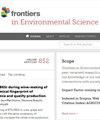碳中和前沿跟踪
IF 3.3
3区 环境科学与生态学
Q2 ENVIRONMENTAL SCIENCES
引用次数: 0
摘要
这项关于碳中和国际研究趋势的系统性研究强调了碳中和在应对全球变暖和推动可持续发展中的关键作用。通过利用 "Web of Science Core Collection "数据库和使用 CiteSpace 软件进行可视化分析,我们研究了 2223 篇研究论文,以追踪主要国家、机构和作者的影响力和趋势。研究结果表明,论文发表量大幅增加,表明碳中和研究具有强劲的发展潜力。研究还发现,环境科学、环境研究以及能源和燃料科学是核心的跨学科中心,凸显了跨学科合作的重要性。值得注意的是,中国在出版物产出方面处于领先地位,但在引文影响力方面还有待提高,这表明中国需要提高研究质量和国际知名度。研究结果有助于指导未来的研究方向、政策制定和跨学科合作,特别是在环境科学和能源领域,以加快实现碳中和和全球气候治理。本文章由计算机程序翻译,如有差异,请以英文原文为准。
Carbon neutralization frontier tracking
This systematic study on the international research trends in carbon neutrality underscores its critical role in combating global warming and advancing sustainable development. By leveraging the “Web of Science Core Collection” databases and employing CiteSpace software for visual analysis, we examined 2223 research papers to track the influence and trends of key countries, institutions, and authors. Our results reveal a significant increase in publication volume, indicating a robust development potential for carbon neutrality research. The study also identifies environmental science, environmental research, and energy and fuel science as central interdisciplinary hubs, highlighting the importance of cross-disciplinary collaboration. Notably, China leads in publication output but has room for improvement in citation impact, suggesting a need for enhanced research quality and international visibility. The study's findings are instrumental for guiding future research directions, policy-making, and interdisciplinary cooperation, particularly in the fields of environmental science and energy, to accelerate progress towards carbon neutrality and global climate governance.
求助全文
通过发布文献求助,成功后即可免费获取论文全文。
去求助
来源期刊

Frontiers in Environmental Science
Environmental Science-General Environmental Science
CiteScore
4.50
自引率
8.70%
发文量
2276
审稿时长
12 weeks
期刊介绍:
Our natural world is experiencing a state of rapid change unprecedented in the presence of humans. The changes affect virtually all physical, chemical and biological systems on Earth. The interaction of these systems leads to tipping points, feedbacks and amplification of effects. In virtually all cases, the causes of environmental change can be traced to human activity through either direct interventions as a consequence of pollution, or through global warming from greenhouse case emissions. Well-formulated and internationally-relevant policies to mitigate the change, or adapt to the consequences, that will ensure our ability to thrive in the coming decades are badly needed. Without proper understanding of the processes involved, and deep understanding of the likely impacts of bad decisions or inaction, the security of food, water and energy is a risk. Left unchecked shortages of these basic commodities will lead to migration, global geopolitical tension and conflict. This represents the major challenge of our time. We are the first generation to appreciate the problem and we will be judged in future by our ability to determine and take the action necessary. Appropriate knowledge of the condition of our natural world, appreciation of the changes occurring, and predictions of how the future will develop are requisite to the definition and implementation of solutions.
Frontiers in Environmental Science publishes research at the cutting edge of knowledge of our natural world and its various intersections with society. It bridges between the identification and measurement of change, comprehension of the processes responsible, and the measures needed to reduce their impact. Its aim is to assist the formulation of policies, by offering sound scientific evidence on environmental science, that will lead to a more inhabitable and sustainable world for the generations to come.
 求助内容:
求助内容: 应助结果提醒方式:
应助结果提醒方式:


